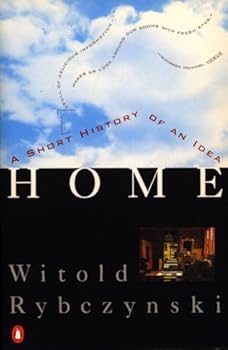Home: A Short History of an Idea
Select Format
Select Condition 
Book Overview
Walk through five centuries of homes both great and small--from the smoke-filled manor halls of the Middle Ages to today's Ralph Lauren-designed environments--on a house tour like no other, one that... This description may be from another edition of this product.
Format:Paperback
Language:English
ISBN:0140102310
Release Date:July 1987
Publisher:Penguin Books
Length:272 Pages
Weight:0.55 lbs.
Dimensions:0.7" x 5.1" x 7.7"
Customer Reviews
5 ratings
Perfect companion to invite "Home"
Published by Thriftbooks.com User , 19 years ago
Rybczynski's elegant prose makes "Home: A Short History" a perfect fireside companion -- not least because he'll make you think about why you positioned your most comfy chair beside the fireplace, how your nice halogen reading light has transformed your evening hours, and whether you'd ever have even been permitted to sit down at the court of a French king.If Tom Wolfe's "From Bauhaus to Our House" is a savage indictment of modern architecture, Rybczynski's book is no less disappointed but even more careful to show how far back in history architects went astray from the guiding principle of 'how to keep humans comfortable'. Till I read Rybczynski, I hadn't realized that 19th century women were more concerned with the sensible flow of activity from room to room in a house, and more interested in time/labor saving innovations such as electricity, than were the architects of the time: they were still preoccupied with the regularity of the façade rather than the sensible use of space inside the home.In fact, I'd add a third book to add to your fireside reading about the home and its development in modern times: "A Place of My Own: The Education of an Amateur Builder", by Michael Pollan. (His meeting with the unlucky souls who live in a Peter Eisenmann home is worth the price of admission...)
For anyone buying or building a home.
Published by Thriftbooks.com User , 22 years ago
I first read this book 14 years ago and it changed my life. This book is a must for anyone buying or building a home. You will never look at a house in the same way again, and you will appreciate good and functional design as never before . Your understanding and excitment at the things that make a house a pleasant home will be enhanced more by this book that any academic or popular text on the subject that I have seen or read. The author weaves together the historcal and social aspects, as well as design, in an intriguing tale. This is truly absorbing reading, you will not want to put it down. It is plainly and simply, very well writen. Rybczyski speaks as one of us.
The underlying concepts of domesticity
Published by Thriftbooks.com User , 24 years ago
I love this book. I love the topic, analyzing the humble dwellingplace for its universals. I love the way he has organized by those very topics rather than by the detail of historic era or functional object. "Home" liberates the whole topic to a level whidh allows the reader to consider what all people have in common for their needs and ambitions, and it inspires such optimism for it demonstrates how resourceful people naturally are. The reader feels so much more aware of mindless routines and can delight in the choices of continuing what is habit or deliberately designing a new tradition. For this reason I like using the book with middle school and high school students. It is too long for the time allowed in the school calendar, but it suits a jigsaw approach of different groups of students studying one of the conceptual chapters and applying the insights to their own lives. The reading level is challenging but appropriate if students are not expected to read too much of it in too short a time. This is one of those treasured volumes that suits the purest progressive tradition of education: it is based on authentic experience which helps students find meaning in their real lives here and now, all the while stretching their capacity to see logic in the world. A nice companion to it is "House" by Tracey Kidder for its similarly direct and quiet manner of discussing the decisions people make, alone and collaboratively, to improve their living situation. Like "Cod", this book should be the way students learn history: focused on a recognizable topic and connecting years and years of interaction between people as it describes the everyday personal consequences of innovation and competition. 'Home: a short history of an idea" needs more than five stars, and it needs to be widely available to schoolchildren, perhaps by individual chapter.
An easy read for the student of architecture and design
Published by Thriftbooks.com User , 24 years ago
I read this book for a graduate class in architectural interiors and it is truly delightful. Rybczynski presents simple truths that make so much sense-- these are presented in clear, layman's terms; easy for anyone to understand and very enjoyable. I've since been searching for more of his work.
One of the most thought-provoking books that I've read!
Published by Thriftbooks.com User , 25 years ago
I read "Home: A Short History of an Idea" when it first came out and I'm re-reading it again with great pleasure. So many of the day-to-day aspects of how we function in our environment are taken for granted . . . as though they just happened spontaneously ! This book would be very worthwhile for anyone interested in a multi-discipline approach to studying our culture, history, furnishings and art. I recommend it highly!




